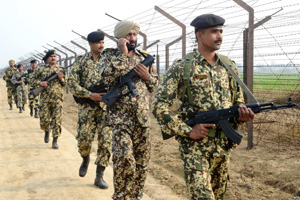Jammu, Oct 7: Indian and Pakistani troops clashed again Tuesday along the Line of Control (LoC) in Jammu and Kashmir, sparking fear at the border and forcing thousands to flee to safer places.
Defence ministry spokesman Colonel Manish Mehta told media that the Pakistan Army used small arms to fire at Indian positions in Balnoi sector in Poonch district.
"The firing started at 2.20 p.m. And it is still going on. Our troops have effectively retaliated," he said. There were no fresh casualties on the Indian side.
The latest violation of the 2003 ceasefire along the Jammu and Kashmir border has sparked fresh tensions along the border. Indian officials have said an estimated 20,000 people have fled their homes in border areas.
In Islamabad, Pakistan registered a protest with the UN Military Observer Group in India and Pakistan (UNMOGIP) over the firing by the Indian military.
The UN group would visit the affected areas, Geo News quoted the Pakistani military's media wing Inter-Services Public Relations (ISPR) as saying.
India said five Indian civilians were killed in heavy firing by the Pakistani military Monday. Pakistani officials said the Indian firing has left four civilians dead.
The Pakistan Army had Monday too violated the truce. The paramilitary Pakistan Rangers have also targeted Border Security Force (BSF) as well as civilian positions on the border in the last two days.
For the first time, the Rangers and BSF failed to exchange sweets on the border Monday on the occasion of Eid.
On Tuesday, BSF Director General D.K. Pathak visited the border outposts of the BSF in Jammu and Samba districts.
Three civilians were injured overnight on the Indian side in firing and mortar shelling by Pakistani forces, police said Tuesday.
"Three civilians were injured in Arnia town," a senior police officer told IANS in Jammu. He added that the BSF hit back at the Pakistan Rangers.
The firing, which again started between the Rangers and the BSF Monday evening, continued Tuesday in Arnia, Pargwal, Kanachak, Ramgarh and other places in Jammu and Samba districts.
Thousands of villagers from the border areas of Jammu, Samba and Kathua districts have fled their homes and moved into makeshift camps.
Journalists who visited the border villages were told that the Pakistani firing was "very heavy".
BSF officers say that Pakistani forces have intensified attacks on Indian border posts in a desperate bid to give cover to Islamist militants trying to sneak into Jammu and Kashmir.
But Jammu and Kashmir Chief Minister Omar Abdullah denied this, telling CNN-IBN channel that the real reason for the turmoil on the border was the internal situation in Pakistan.
"This Pakistani provocation has nothing to do with attempts to infiltrate militants into Jammu and Kashmir," Abdullah said.
"It is all due to the internal situation in Pakistan," he said, referring to the unending tensions between the government of Prime Minister Nawaz Sharif and the opposition.
"Sharif is trying to deflect attention from his internal crisis," he said.
Abdullah said the Pakistani aggression was a major challenge to the Modi government and simply lodging a protest with Islamabad won't do.
Home Minister Rajnath Singh Monday warned Pakistan to stop violating the ceasefire, saying "times have changed in India".





Comments
Add new comment